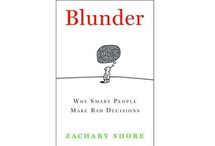Blunder: Why Smart People Make Bad Decisions
By Zachary Shore
272 pages;
Bloomsbury
Reading the newspaper each morning, most of us let out at least one little mutter of "Why on earth would they think that was the thing to do?" Politicians, entrepreneurs, doctors, garage attendants, we all seem prone to taking actions that run contrary to common sense and our own self-interest, making a bad situation worse. In his engaging new book, Blunder: Why Smart People Make Bad Decisions (Bloomsbury), Zachary Shore sets out to tell us why "all nations, along with businesses and individuals, weaken themselves." Shore approaches his topic from a historian's perspective, finding examples through the ages of what he calls "cognition traps"—rigid ways of thinking or fears that prevent us from really seeing a situation clearly. He teases out the cause and effect of seven such traps (from "infomania" to "exposure anxiety"), with witty stories of famous blunders, such as Thomas Edison's refusal to give up direct current, and cogent analysis of global crises, including the Cold War, Vietnam, and the recent invasion of Iraq. Beyond shining a light on our propensity to apply an old solution to a new situation, Shore's goal is to teach the basis of good judgment (i.e., not being prone to blunders). Like all good historians, he's hoping we can avoid making the same mistake twice.
— Elaina Richardson


